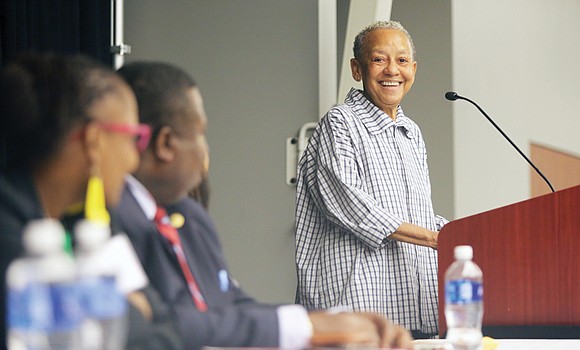Moonlight, Rudolph and Black Lives Matter: Poet Nikki Giovanni takes on range of subjects at VUU talk
5/5/2017, 9:03 p.m.

By Holly Rodriguez
The Black Lives Matter movement is benefiting white women, the movie “Moonlight” was a showcase of crazy, and Rudolph the Red-Nosed Reindeer is a story that has a not-so-sweet, enduring side to it.
So said award-winning poet, writer, commentator, activist and Virginia Tech professor Nikki Giovanni.
Ms. Giovanni was the keynote speaker April 28 for “In the Humanities and Beyond,” a daylong conference at Virginia Union University on undergraduate research.
Her luncheon talk, held in VUU’s Claude G. Perkins Living and Learning Center, covered the subjects of segregation, activism, African-American culture, meeting the queens of England and Ghana, beer, and male and female body parts.
All of her topics were rooted in an inspirational message about the responsibility of African-Americans as a people to stand up, speak out, be heard and share stories of trial and triumph.
Richmond Mayor Levar M. Stoney, who briefly attended, proclaimed April 28 “Nikki Giovanni Day,” as did Mayor Richard Headen of the village of Lincoln Heights, Ohio, where Ms. Giovanni grew up.
“I’m incredibly proud of the Black Lives Matter movement,” Ms. Giovanni told the Richmond Free Press in an interview before her talk. “The movement gives impetus to a number of people for change and it’s been a big help to mobilizing white women.
“It’s easy to see how, for white women, rights to their own bodies are being bought and sold in Washington,” she said, referring to President Trump signing legislation in April that strengthens state and local government rights to withhold federal funding for family planning services related to contraception, fertility, pregnancy care and more.
Countering such measures requires strength and resilience that can be derived from art, she said. Music, for example, helped Africans cope with the devastating circumstances of the Middle Passage and helped African-Americans build communities once they arrived in the foreign land that would become America.
“Think about being under the deck of a ship, not knowing where you are going or what you’re going to face when you get there,” she said. “How did we handle it? Music.”
Like all creative endeavors, today’s art has some hits and misses in her opinion.
“I hated that movie ‘Moonlight,’ ” she said. “Everybody in it was crazy.
“But ‘Hidden Figures’ — now that was the best film of the year,” she continued. “There are more stories like those that need to be told, and the generation coming up needs to find and tell those stories.”
Activists in the Civil Rights Movement created space for stories such as “Hidden Figures” to be lived through and told, Ms. Giovanni said in her speech. While racism is here and is likely to continue to exist, African-Americans no longer have to face “colored only” water fountains, entrances or seating on buses.
“I’m proud of the work of my generation because we shut down segregation,” she said. “Black people are an amazing people.”
Civil rights icons such as Fannie Lou Hamer, Dr. Martin Luther King Jr., Medgar Evers and others endured, were beaten, abused and died so that the current generation could vote without worrying about threats to their lives, she said.
And she warned that African-Americans must be steadfast and careful about getting distracted by the antics of the current administration in the White House.
In addressing the apathy that seems to exist among several voting segments, she said active participation in the community is a must, not an option.
“You don’t have the right to give up,” she said. “When I hear people saying they don’t have an hour to go vote, or whatever, if anybody feels they can’t do something, look no further than Fannie Lou Hamer, who took a beating so that we could vote.”
She criticized celebrities and others, including Steve Harvey and Martin Luther King III for visiting with the current president, saying such meetings were just a veil for the fact that President Trump is selling racism.
Just like Santa Claus used Rudolph the Red-Nosed Reindeer.
“Everybody laughed at Rudolph until they needed something from him,” she said. “We can’t make this fool in the White House make us feel alienated from our own country — this country belongs to us.”
Telling the stories of how African-Americans persisted and thrived, even during the suffocating factors of extreme oppression and institutionalized racism, is important in creating African-American legacy, she said.
“Remember to tell the stories you have and share them because you don’t want someone else to tell your story,” she said. “Happiness is a decision — and (stories give) you something that you can build on.”
She ended her talk by describing how the ability of African-Americans to make “chitlins” into a delicacy is an example of “making a way out of no way.”
And she read her poem, “Stardate 18628.190.”






